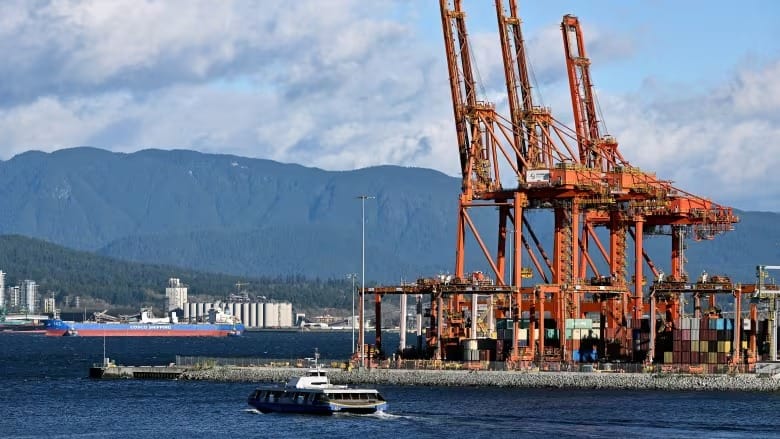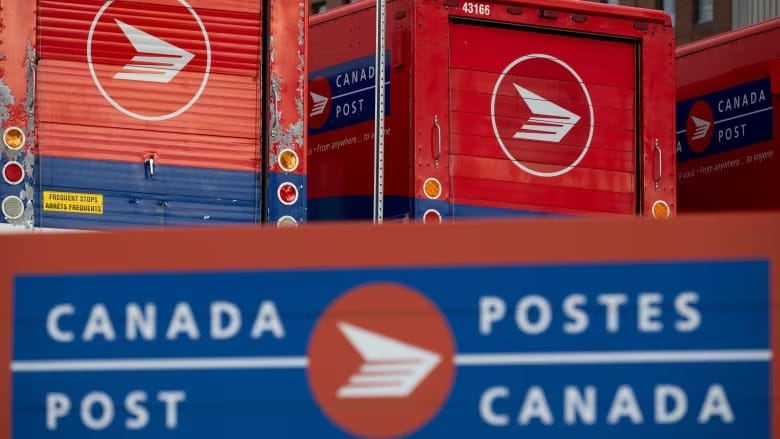B.C. ports are frozen amid a labour dispute. What does this mean for Canadians?
Experts say Canadians won’t see impact on shelves right away, but businesses could take a hit

A major trade route was disrupted Monday when employers locked out over 700 foremen at British Columbia ports, raising nationwide concerns over Canada's supply chain.
The shutdown comes amid another partial closure of two terminals at the Port of Montreal due to a separate labor dispute, potentially leading to further delays for businesses as the holiday season approaches.
The B.C. Maritime Employers Association (BCMEA) announced its "difficult decision" to lock out workers Monday afternoon after the International Longshore and Warehouse Union (ILWU) Local 514 issued a 72-hour strike notice for limited job action starting 8 a.m. PT Monday. The lockout does not affect grain or cruise operations.
The union’s planned action included an overtime ban and a refusal to implement tech changes if an agreement was not reached. The ILWU previously accused BCMEA of "acting recklessly" by threatening the lockout.
Canada’s West Coast serves as a primary gateway for maritime trade, with ports there handling $800 million in cargo daily, accounting for about 25% of the goods flowing through the country, according to Pascal Chan, a senior director at the Canadian Chamber of Commerce.
What Happens Next
When major port operations are interrupted, ships carrying goods for that port may anchor nearby, waiting for the strike to end, particularly those carrying perishable items, according to Fraser Johnson, an operations management professor at Western University’s Ivey Business School. However, most ships are rerouted to other ports, often in the U.S., which increases costs for Canadian businesses.
Freight rates have already tripled over the past year due to factors like issues in the Suez Canal and Panama Canal delays. The B.C. port closure "affects virtually everything," Johnson said, from holiday goods to exports like lumber, coal, and vehicles.
"For every day the port is shut down, it takes about a week to recover," Johnson noted.
Meanwhile, in Montreal, two terminals are closed as longshore workers strike, halting 40% of container capacity at Canada’s second-largest port. Some ships en route to Montreal have already diverted to other ports, and more are expected to follow, according to the Montreal Port Authority.
The primary concern for B.C. port workers is job security amid automation, while Montreal workers are pushing for work-life balance.
Consumer Impact
Although immediate shortages on store shelves are unlikely, a prolonged dispute could lead to cost increases as shipping expenses accumulate.
“It might not be Day 1,” Chan said, “but … millions of dollars in lost trade daily will impact Canadians.”
Small- and medium-sized businesses will likely feel the effects first, as they have less flexibility in adjusting contracts when shipping costs rise.
The July 2023 B.C. port strike saw B.C. exports drop by 23%, their lowest level since the pandemic, Chan added.
Fertilizer Canada warned last Friday that a B.C. port shutdown would cost the fertilizer industry $9.7 million per day in lost potash sales revenue. Canada is the world’s largest potash producer.
Labour Minister Steven MacKinnon shared on social media Saturday that federal mediators are ready to assist, emphasizing it is the "responsibility" of employers and the union to negotiate a deal.
"Businesses, workers, and farmers are counting on them to get a deal," he said.
These labor disputes add to ongoing supply chain issues in Canada, including a grain terminal strike in September and temporary closures of Canada’s two largest railways over the summer due to a rail strike.
Experts warn that ongoing disruptions could harm Canada’s reputation as a reliable trade partner.
"Continuous threats to Canada’s supply chain could tarnish our global reputation, and recovering from that is not easy," said Hossein Piri, an assistant professor at the University of Calgary’s Haskayne School of Business.





